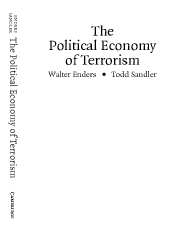Book contents
- Frontmatter
- Contents
- List of Tables and Figures
- Preface
- 1 Terrorism : An Introduction
- 2 The Dilemma of Liberal Democracies
- 3 Statistical Studies and Terrorist Behavior
- 4 Counterterrorism
- 5 Transference
- 6 International Cooperation : Dilemma and Inhibitors
- 7 Hostage Taking
- 8 After 9/11
- 9 The Economic Impact of Transnational Terrorism
- 10 Homeland Security
- 11 The Future of Terrorism
- References
- Author Index
- Subject Index
8 - After 9/11
Published online by Cambridge University Press: 06 July 2010
- Frontmatter
- Contents
- List of Tables and Figures
- Preface
- 1 Terrorism : An Introduction
- 2 The Dilemma of Liberal Democracies
- 3 Statistical Studies and Terrorist Behavior
- 4 Counterterrorism
- 5 Transference
- 6 International Cooperation : Dilemma and Inhibitors
- 7 Hostage Taking
- 8 After 9/11
- 9 The Economic Impact of Transnational Terrorism
- 10 Homeland Security
- 11 The Future of Terrorism
- References
- Author Index
- Subject Index
Summary
In February 1998, Osama bin Ladin and Ayman al Zawahiri published a signed statement declaring a fatwa against the United States. Bin Laden, al Zawahiri, and the other signatories to the statement called for retribution against the Unites States for its having “declared war against God.” The statement went on to claim that it was the individual duty of every Muslim to murder any American anywhere on earth. Three months later, in an interview on ABC-TV, bin Laden stated: “We believe that the worst thieves in the world today and the worst terrorists are the Americans. Nothing could stop you except perhaps retaliation in kind. We do not have to differentiate between military and civilian.” As we now know, the fatwa resulted in an unprecedented 9/11 attack against the United States.
As we discuss in subsequent chapters, the tragedy of 9/11 was a defining moment for the United States, other Western nations, and the Islamic nations in many profound ways. Chapter 9 focuses on the economic costs of terrorism, including the direct and indirect costs of 9/11. Chapter 10 evaluates homeland security, and Chapter 11 speculates on the future of terrorism. In this chapter, we report the results of two studies that quantify the ways in which 9/11 has changed the types and locations of terrorist incidents.
The competing forces: reduced strength versus enhanced sensitivity
As a result of the US-led war on terror, about two-thirds of al-Qaida leaders have been either killed or captured.
- Type
- Chapter
- Information
- The Political Economy of Terrorism , pp. 188 - 202Publisher: Cambridge University PressPrint publication year: 2005



